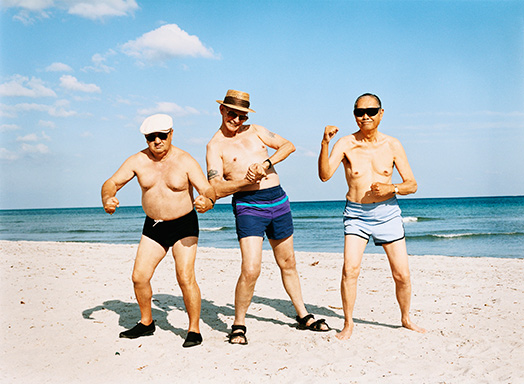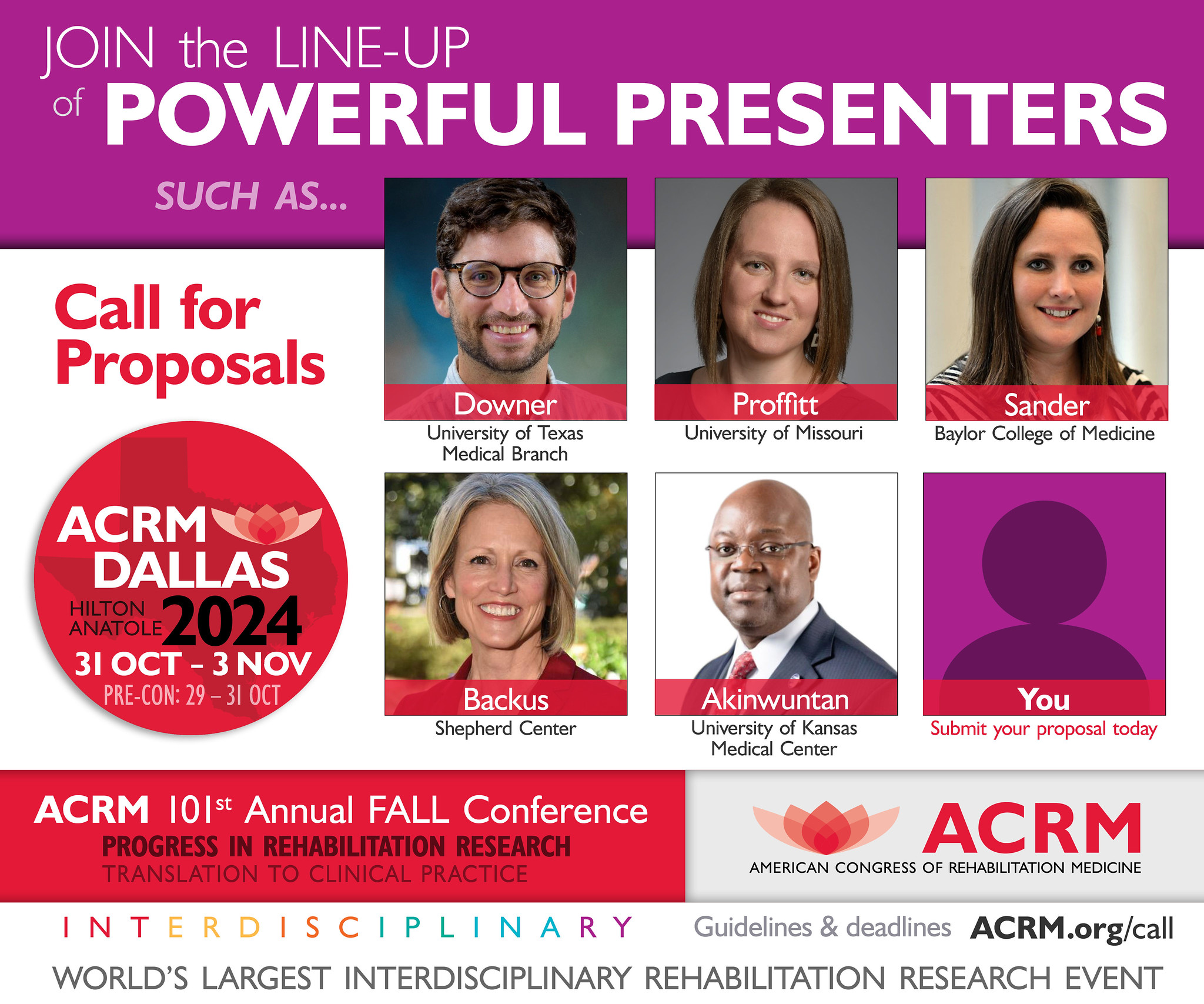INSTRUCTIONAL COURSE DETAIL
MON, 26 OCT: 8:00 AM – 5:00 PM
DESCRIPTION
 Determining the best setting for the patient requires a thorough understanding of rehabilitation services, the essential aspects of care delivery, and evaluation of pivotal evidence-based outcomes. Rehabilitation encompasses a process, practice, and philosophy of care and is not simply a care setting. In order to improve performance, coordination of care across the healthcare system is critical. The purpose of this eight hour educational program is to increase essential knowledge and skills required to optimize the effective care transitions and determination of the most appropriate care outcomes for stroke survivors and their families. Evidence-based transitions of care models and practices will be discussed.
Determining the best setting for the patient requires a thorough understanding of rehabilitation services, the essential aspects of care delivery, and evaluation of pivotal evidence-based outcomes. Rehabilitation encompasses a process, practice, and philosophy of care and is not simply a care setting. In order to improve performance, coordination of care across the healthcare system is critical. The purpose of this eight hour educational program is to increase essential knowledge and skills required to optimize the effective care transitions and determination of the most appropriate care outcomes for stroke survivors and their families. Evidence-based transitions of care models and practices will be discussed.
PRESENTERS
Michelle Camicia, MSN, CRRN, CCM
Kaiser Foundation Rehabilitation Center, Vallejo CA
Pamela Roberts, PhD, OTR/L, SCFES, FAOTA, CPHQ
Cedars-Sinai Medical Center, Los Angeles CA
Richard Riggs, MD
Cedars-Sinai Medical Center, Los Angeles CA
Patricia Quigley, PhD, ARNP, CRRN, FAAN, FAANP
James A Haley VAMC, Tampa FL
Janet Prvu Bettger, ScD
Duke University, Durham NC
DIAGNOSIS
Stroke, Other, Geriatric, Rehabilitation of the stroke survivors
FOCUS
Clinical Practice
Secondary Focus Area
Geriatric Rehabilitation
OUTLINE
8-8:15 Opening of Session, Elaine L. Miller, PhD, RN, CRRN, FAAN, FAHA
8:15-10 Presenter: Patricia Quigley, PhD, MPH, ARNP, CRRN, FAAN, FAANP
Title: Linking Stroke Related Deficits Affect Fall Risk Factors and Injury Reduction
10-10:15 Break
10:15-12 Presenter: Michelle Camicia, MSN, RN, CRRN
Facilitating Successful Transitions for Individuals and Families Following Stroke
Noon-1 Lunch on your own
1 – 2:15 Presenter: Pamela Roberts, PhD, OTR/L, SCFES, CPHQ, FAOTA and Richard Riggs, MD
Title: Factors Impacting Stroke Readmissions and Strategies to Reduce Readmissions.
2:30-3:30 Presenter: Janet Prvu Bettger, ScD, FAHA
Title: Measuring the Effectiveness of Transitional Care Interventions: What Have We Learned and Where We Are Falling Short
*Emphasis will be on application and tracking
3:30-3:50 Group work – Putting what you have learned into action
4:00-5:00 Moderated Panel Discussion on Care Transitions and Evaluation
ABSTRACT BODY
In many instances, the process and outcomes associated with care transitions and targeted outcomes for stroke survivors is ineffective. Unfortunately, many clinicans do not possess the necessary knowledge and skills to advocate and facilitate care transitions resulting in high quality outcomes for stroke survivors, families and the healthcare delivery systems. Determining the best setting for the patient requires a through understanding of rehabilitation services, the essential aspects of care delivery and evaluation of pivotal evidence-based outcomes. Rehabiltiation encompasses a process, practice, and philosophy of care and is not simply a care setting. In order to improve performance, coordination of care across the healthcare system is critical. The purpose of this four hour educational program is to increase essential knowledge and skills required to optimize the effective care transitions and determination of the most appropriate care outcomes of stroke survivors and their families. Evidence-based transitions of care models and practices will be discussed along with opportunities to apply this knowledge to participants’ practice settings.
LEARNING OBJECTIVES
- Describe key program elements to promote successful transition from acute care to the community setting of the stroke survivor.
- Identify opportunities to improve care transitions across the care continuum.
- Discuss the major factors affecting readmissions of stroke survivors.
- Review the evidence pertaining to reduction of fall risk in all care settings.
- Critique the study designs of transitional care trials conducted to date and discuss the applicability and utility of novel practice based designs to examine effectiveness and improve time to translation of appropriate strategies
BIO SKETCHES
Michelle Camicia MSN, RN, PHN, CRRN, CCM has been in the Director of Operation at the Kaiser Foundation Rehabilitation Center| Vallejo Kaiser Medical Center for over 12 years. In her this role as director she is responsible for nursing, physical, occupational, speech & recreation therapy, case management, psychology & research operations at Kaiser Permanente’s (KP) Northern CA Inpatient rehabilitation hospital along with being responsible for quality, service, accreditation, human resource management, research. She is also the co‐director Center for Excellence for Individuals with Disabilities. Co‐chair of Napa Solano KP Diversity Council. Member of KP National Disabled Populations Support Council. Ms. Camicia has a very distinguished career of publication and service to organizations such as the NIH National Advisory Board for Medical Rehabilitation Research, the Editorial Board of Rehabilitation Nursing, the ANA Nursing Scope and Standards Advisory Group, and the American Organization of Nurse Executives Post-Acute Care Nurse Leaders Core Competencies Task Forces, along with her 2013 Award by Sigma Theta Tau International Honor Society for Nursing Lambda Gamma Chapter “Excellence in Research Award”. Another very important contribution to the improvement of quality of care for all rehabilitation patients is the following article: Camicia, M., Black, T., Ferrell, J., Waites, K., Wirt, S., Lutz, B. and the Association of Rehabilitation Nurses Task Force (2014). The essential role of the rehabilitation nurse in facilitating care transitions: A white paper of the Association of Rehabilitation Nurses. Rehabilitation Nursing, 39, 3-15.
Pamela Roberts, PhD, MSHA, OTR/L, SCFES, FAOTA, CPHQ is the Program Director for Physical Medicine and Rehabilitation, and Neuropsychology at Cedars-Sinai Medical Center, Los Angeles, California. Dr. Roberts has worked throughout the continuum of care as a clinician, administrator and researcher. She also teaches at the University of Southern California, and guest lectures at other local universities, a national FIM trainer and consultant for Uniform Data System in Buffalo, New York, and a CARF surveyor for CARF…Commission on Accreditation for Rehabilitation Facilities. She is involved in the American Congress of Rehabilitation Medicine-Stroke Interdisciplinary Special Interest Group, American Occupational Therapy Association, Accreditation Council of Occupational Therapy Education, the American Medical Rehabilitation Providers Association Quality Committee, National Quality Forum Measures Application Partnership Post-Acute Care/Long-Term Care Workgroup member, past chair of the California Hospital Association Center for Medical Rehabilitation Services, and currently serves on the California Hospital Association Post-Acute Care board. Dr. Roberts has served as principal and co-investigator on a variety of research projects including recent 2013 and 2014 publications on readmissions in PMR and AJOT journals. Additionally, Dr. Roberts has provided a variety of workshops and consultations on rehabilitation topics regionally, nationally, and internationally.
Richard V. Riggs, MD is the Chairman and Medical Director of the Department of Physical Medicine Rehabilitation. He is also the Chief Information Medical Officer for Cedars-Sinai Medical Center. He has also been involved in rehabilitation research and in shaping rehabilitation medicine nationally. Dr. Riggs has successfully designed and lead quality and research projects, collaborated with other researchers and study personnel and produced several peer reviewed publications. He has collaborated and provided medical direction on a number of research studies within rehabilitation including a subcontract on an NIH funded study. Further, he has provided leadership in multiple Centers for Medicare and Medicaid Services demonstration projects as well as led hospital wide quality initiatives such as anticoagulation, venous thromoembolism and falls. In summary, he has demonstrated a record of successful and productive quality and research projects and has the experience and expertise to participate in this training grant.
Patricia Quigley, PhD, MPH, ARNP, CRRN, FAAN, FAANP, nurse researcher at the Center of Innovation on Disability and Rehabilitation Research, Tampa VA Hospital, and serves as Associate Chief of Nursing Service/Research; Associate Director VISN 8 Patient Safety Center of Inquiry. Both Advanced Registered Nurse Practitioner and Rehabilitation Clinical Nurse Specialist, James A. Haley Veterans Hospital, she holds several faculty Appointments. Dr. Quigley’s primary research interest is in patient safety, particularly fall prevention and management across the care continuum, testing effectiveness of interventions such a exercise; outcome measurement and program evaluation of fall prevention and rehabilitation programs. Additional research interests are in outcomes of nursing care, osteoporosis management in men, and epidemiology of peripheral neuropathy and aging. Her program of research spans 25 years, and focuses predominately on falls prevention and risk reduction, supporting Veterans and their caregivers. She has been funded by the National Center for Patient Safety and Rehabilitation Research and Development to investigate effectiveness technologies to reduce fall and injury risk, determine the effectiveness of exercise interventions on gait and balance – conducting the first randomized controlled trial specific to fall reduction and exercise on a diagnostic cohort. Additionally, Dr. Quigley directs the multidisciplinary Falls Prevention Clinic at Tampa VA. She is both a Fellow of the American Academy of Nursing and the American Academy of Nurse Practitioners.
Janet Prvu Bettger, ScD, an Associate Professor with Duke University, is a researcher dedicated to improving the patient-centeredness of health care for adults with chronic conditions, particularly stroke and those at risk for functional decline or rehospitalization. She is the lead author for the AHRQ funded systematic review on transitional care interventions for stroke and myocardial infarction published in Annals of Internal Medicine in 2012 and is the Transitions of Care Specialist for the state of Ohio’s Coverdell Stroke Program funded by CDC. In addition to the health care quality and implementation research on care transitions in Ohio, she is an investigator for a randomized clinical trial on stroke transitional care in China. The research in the U.S. and abroad is informed by Dr. Bettger’s comparative effectiveness research on post-acute care options funded by PCORI and NIH. Her substantive research expertise in the areas of stroke, transitional care, rehabilitation, and healthcare quality contribute to the knowledge base for the proposed presentation.
One full day of Instructional Courses $195 Three full days $395
WORLD PASS (from $595) is the best value if you attend just one instructional course and the CORE Conference. Pricing detail CLICK HERE![]()
*Although significant changes are not anticipated, all schedules, sessions, and presenters posted on this website are subject to change.








